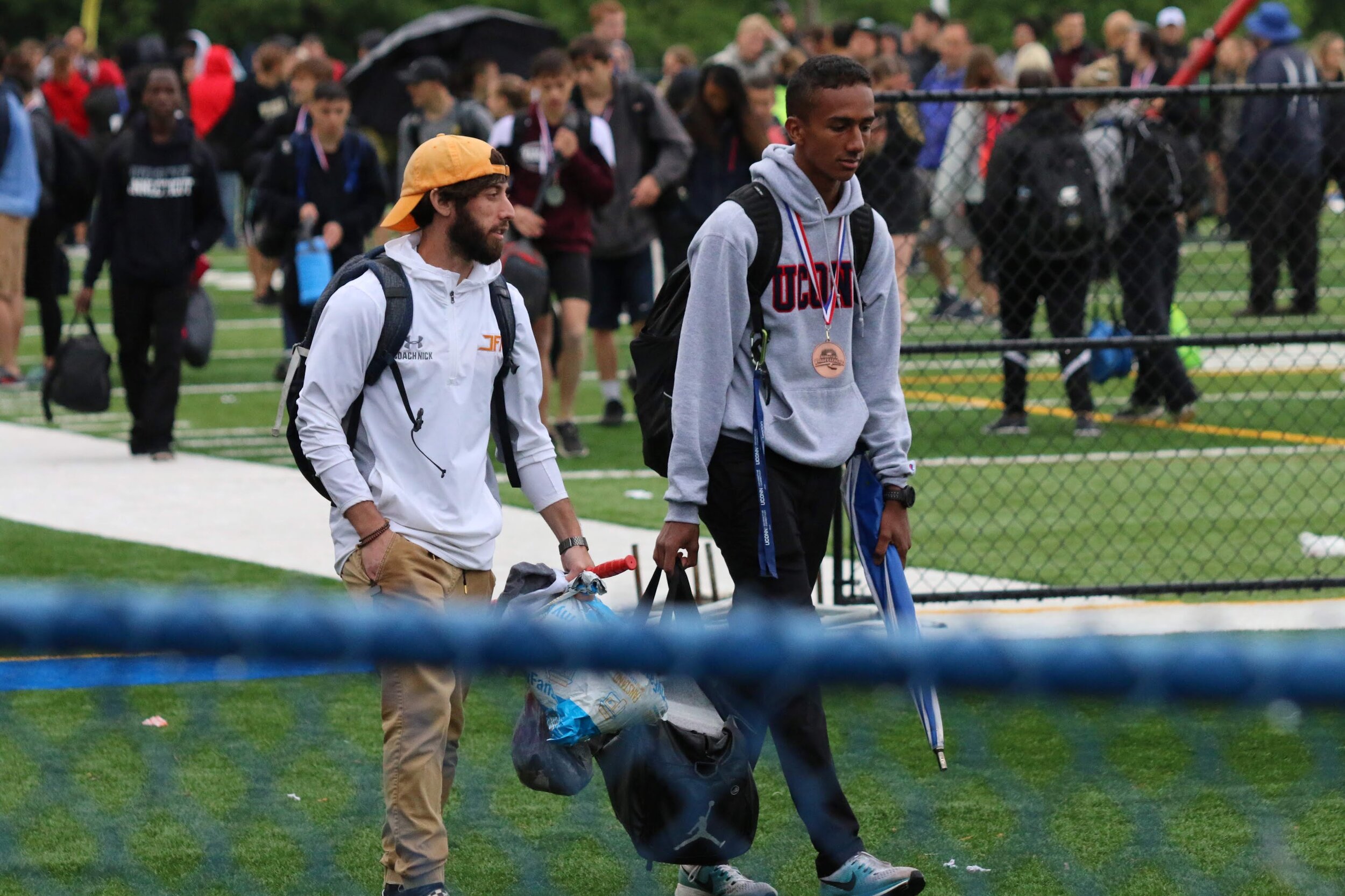How To Stay Motivated In Sports
written by Lois Warden (D1 athlete at Bryant University)
WHAT IS MOTIVATION?
Motivation is essentially the desire to continually complete and work towards a goal or task.
It is the willingness to do something frequently, even when other factors interfere. Motivation is something in everyday life that is important to have. Without basis, goals are often difficult to achieve and even if they are executed the standard at which you completed them was not as well as it could be. Motivation is essential in all aspects of life, whether that be your job, school, or sport. Without motivation to do things you will plateau; wherever you are in training, and often in terms of employment and during college, you won't achieve what you want to and/or will not be what an employer wants. The chain reaction from lack of motivation is hugely detrimental to all aspects of life, however, when talking about sport, motivation is the front and foremost attribute you need to have to be successful, getting the results you desire while enjoying it simultaneously.
WHY IS MOTIVATION IMPORTANT IN SPORTS?
Motivation is essential in sport to maintain the effort you put in to reach the goals you have set. To achieve these goals, you need to persist and work hard; they will not come to you otherwise. Sport is challenging as a whole, and depending on what sport you take part in, it can throw different challenges at you at other times. For instance, becoming a pole vaulter over the years, both injury and obstacles in my mentality have been something I needed to push through. Without motivation, I would not have been able to get through my injury and persist despite not being able to do what I love. I pushed through what I needed to. It meant I could achieve my goals and carry on to further my progress in my sport doing what I love.
The mentality one has in sports is also huge; without the right positive mindset, it is difficult to be motivated to reach your goals. On occasion, there are times where I haven't done so well at practice or in competition. It is difficult at times to uncover the positives and look towards what I can do to improve without being too hard on myself for my performance. Although it is easier said than done, positively evaluating your performances in your events is crucial to staying motivated.
Many different factors affect motivation, and some of these include fatigue, boredom, pain, injury, desire to do other things, etc. To reach your goals and become the best or wherever you want to be, you must be able to stay motivated, and despite all of these different things that could affect your level of motivation, you push through and maintain the desire to keep working hard.
THINGS THAT AFFECT PERFORMANCE
Ability: Your ability as an athlete consists of three different things. Mental ability, physical ability, and tactical ability. Ability is something we are born with an cannot change, yet there are certain aspects of our ability that we can work on to help us as athletes.
Mental ability in sports is essentially being able to consistently perform in the top range of your potential and skill despite opposing circumstances. This is extremely important in sports as being mentally tough can help you get through challenging sessions without letting it affect your motivation. Keep trying to reach your goals.
When you become mentally challenged, it is harder to stay upbeat and positive, opposed to when you are physically unable, as you can push through and see the light and the end of the tunnel.
Physical ability is the ability to perform specific aspects of the sport, specifically your sport without stress or fatigue or the inability to do something. For example, if your personal best in pole vaulting is 13 ft 6 in, then that is for right now your maximum physical ability.
ACCEPTING WHERE YOU ARE IN TERMS OF YOUR PHYSICAL ABILITY IS PART OF THE PROCESS.
If you did not perform well in competition, evaluate where you went wrong, and work on it. Do not expect to PR in every meet. Accept the fact that that is your physical ability for the time being, and fine tune certain aspects of your performance. This will prevent you from being discouraged and being too hard on yourself. Being discouraged during a season or even in competition can lead to worse performances in upcoming events.
Tactical ability is the decisions and actions that the athlete or athletes take to gain an advantage over competitors. Tactical ability is most important in team events as you are more likely to find advantages over your team than in individual events, such as track and field.
The difficulty of competition influences performance: If you go to a competition and you are up against athletes entirely out of our league, it can negatively impact your motivation. However, if you compete against athlete’s way below your standard, you are likely to be further motivated to work harder to stay on top of those athletes. Yet, when you compete with athletes of your ability it is essential to maintain that motivation as it depends on who is most motivated to work harder.
Not only can competitors influence your performance but also external factors that you have no control over, such as weather, atmosphere etc. For some athletes, they work better in the rain, whereas others work best in the heat of the summer. Either way, regardless of their preference, they get what they get on the day and cannot change it, it is out of their control. So do not stress it. Accept the fact that it is what it is, because all athletes are going through the same thing.
Motivation also affects your performance. If you are not motivated to perform, the chances and likelihood of you doing well are a lot lower than if you were utterly motivated to succeed. If you want the desired outcome, then you must put in the time and effort, and make the sacrifices necessary to achieve that desired outcome. Often especially during late teens and college years, athletes experience conflicts of interest, to go out with their friends and have different opportunities they cannot do as an athlete. To be successful, they must be willing to make these sacrifices and difficult choices to get where they want; it is about who pushed harder when they are on the runway or field.
HOW DO ATHLETES MAXIMIZE THEIR MOTIVATION?
Here are a few ways that athletes can maximize their motivation:
FOCUS ON LONG TERM GOALS
To be the best and reach your goals, you must put in the time and effort to do so. There will be times that you will feel tired, you will have conflicts of interest, meaning you have to make sacrifices. However, pushing through this grind when your motivation is at an all-time low makes you so much better on your good days. If you can persist and work hard on your bad days, you are over exceeding on your good days working towards your goals. If you feel unmotivated, if you are struggling, just remind yourself of your goals and why you are love this sport. It is likely to help you feel as though you can push through and keep working for what you want to achieve.
Try to focus in on how you are going to feel when you achieve this goal and how much effort you are putting in now will make it worth it in the end. Generate positive thoughts to push you through these tough times, and before you know it, you will be through that unmotivated patch.
HAVE A GOOD GROUP OR GOOD TRAINING PARTNER(S) TO WORK WITH
As seen above, it is tough to have high levels of self-motivation all day every day. By surrounding yourself with like-minded individuals that can help motivate you will increase your chances of sticking with your plan and achieving your goals as you have set them. This does not always have to be a training partner or a group; it could be a coach, parent, or personal trainer. Whoever it is, they will help encourage you to keep that motivation and help you stay on the path to progress.
FOCUS ON INSPIRATIONS
Often focusing on something helps keeps athletes on track, yet it must be specific to the individual. For certain athletes focusing on their competitors can be harmful, as they tend then not to focus on themselves and become obsessed with doing everything in their power to be or beat that person.
Despite some individuals being like this, some may even become intimidated and lose motivation because they feel as though they are not as good as that person. Or they will change their outlook on their progress and think down on themselves ultimately affecting their maximum potential.
It is essential to have inspirations and if it works for your individual needs to focus on a competitor, then do so. However, make sure to analyze the way you stay motivated, not because a textbook says this helps a certain percentage of people. Each athlete is an individual and responds to everything differently. It is essential to respond to your own needs and not anyone else’s. Inspirations can help athletes stay on track and aspire to be like somebody else increasing their motivation to reach their goals.
Signs of low motivation / What can be detrimental to motivation
SIGNS OF LOW MOTIVATION:
Lack of desire to practice frequently
Lack of effort in training
Not finishing training or skipping all together
Inconsistent effort to meet goals
Being quiet and unengaged
Poor body language
THINGS THAT CAN GET IN THE WAY OF STAYING MOTIVATED:
Injury
Not performing well in the past
Schoolwork
Mental illness
Balancing social life
Lack of support
HELLO
MY NAME IS COACH NICK
FOLLOW US ON INSTAGRAM
Want To Read More?




















We’ve heard it all. Every excuse in the book to skip a post-workout stretch. However, static post-workout stretching is equally as important to training as the formal workouts themselves and should be made a regular, consistent part of any track & field athlete’s training plan.